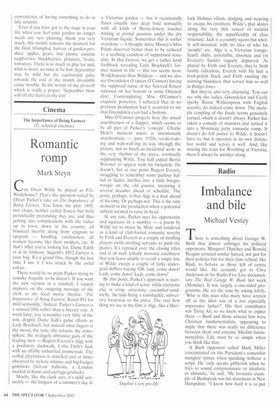Romantic romp
Mark Steyn
Can Oscar Wilde be played as P.G. Wodehouse? That's the question raised by Oliver Parker's take on The Importance of Being Earnest. You know the plot: 1895, two chaps, neither called Ernest but both periodically pretending they are, and thus getting into complications with the ladies up in town, down in the country, all bounced merrily along from epigram to epigram — handbag. carelessness, all women become like their mothers, etc. If that's what you're looking for, Dame Edith et al in Anthony Asquith's 1952 Earnest is your bag. It's a grand film, though the last time I saw it I was struck by the awful colour.
There would be no point Parker trying to remake Asquith, so he doesn't. If you want the new version in a nutshell, I cannot improve on the outgoing message of the clerk at my local movie theatre: 'The Importance of Being Earnest. Rated PG for mild sensuality.' Indeed. Parker's Earnest is a sensual film rather than a literate one. A week later, you remember very little of the text, despite Dame Judi's game efforts as Lady Bracknell, but instead what lingers is the mood, the tone, the colours, the atmosphere, the strangely obtrusive gaits of the leading men — Rupert Everett's Algy with a predatory duckwalk, Colin Firth's Jack with an affable unhurried promenade. The verbal playfulness is matched and at times obscured by stylistic whimsy and big-budget gimmicks (hot-air balloons, a London snarled in horse-and-carriage gridlock).
Mostly, like the clerk says, it's mild sensuality — the languor of a summer's day in
a Victorian garden — but it occasionally flares visually into deep bold sensuality with all kinds of Burne-Jonesy touches hinting at primal passions under the dry Victorian façade. Sometimes this is rather overdone — I thought Anna Massey's Miss Prism deserved better than to be reduced to a seething cauldron of suppressed sexuality. In this Earnest, we get a rather lurid flashback revealing Lady Bracknell's former station in life — this too seems more Wodehousian than Wildean — and we also see Gwendolen (Frances O'Connor) having the supposed name of her beloved Ernest tattooed on her bottom in some Oriental dive. Contemplating Miss O'Connor's exquisite posterior. I reflected that in no previous production had it occurred to me that Gwendolen even had a bottom.
Miss O'Connor projects here the sexual assertiveness of a flapper, which seems to be all part of Parker's 'concept'. Charlie Mole's insistent music is intentionally anachronistic — pure 1920s. vo-de-o-doing and wah-wah-ing its way through the picture, not so much an incidental score as the very rhythm of the piece, eventually supplanting Wilde. You half expect Bertie Wooster to appear with his banjulele. He doesn't, but at one point Rupert Everett, struggling to remember some parlour ballad or lieder, lurches into a little boogiewoogie on the old joanna, inventing it several decades ahead of schedule. The point, perhaps, is that Algy is a man ahead of his time. Or perhaps not. This is the only moment in the production when a potential subtext seemed to raise its head.
At any rate. Parker sees his opportunity and squeezes in a number — a poem by Wilde set to music by Mole and rendered as a kind of club-footed romantic novelty by Firth and Everett as a couple of strolling players (with strolling servants to push the piano). It's reprised over the closing titles and is of such lethally moronic catchiness that you leave unable to recall a single line of Wilde except a couple of larky undergrad duffers baying 'Oh, lady, come down! Lady, come down! Lady, come down!'
By this point, Parker's approach is starting to make a kind of sense: while everyone else is crisp, articulate, cucumber-sandwichy, the lads bring a ramshackle, subversive looseness to the piece. The very first thing we see in the film is Algy, like a Sher
lock Holmes villain, dodging and weaving to escape his creditors. Wilde's play skates along the very thin veneer of societal respectability, the superficiality of class structure. Jack is a country squire but wholly self-invented, with no idea of who his 'people' are. Algy is a Victorian loungelizard, shifty, unreliable, dissolute and (in Everett's hands) vaguely depraved. As played by Firth and Everett, they're both faintly ridiculous, Everett with his hair a boot-polish black and Firth exuding the winning blandness that served him so well in Bridget Jones.
But they're also very charming. You can see why the ladies, Gwendolen and Cecily (perky Reese Witherspoon with English accent), do indeed come down. The multiple coupling of the finale seems genuinely earned, which it doesn't always. Parker has taken a comedy of manners and turned it into a 90-minute jazzy romantic romp. It doesn't do full justice to Wilde, it doesn't have to, but it operates in its own distinctive world and serves it well. And, like missing the train for Worthing at Victoria, there'll always be another along.


























































 Previous page
Previous page